10 Confusing Feelings You Might Face as an Adult Survivor of Childhood Sexual Abuse
Here at Psychology Junkie I spend a lot of time talking about Myers-Briggs® personality types. However, that wasn’t my main intent when I created this blog. Initially I hoped to write about PTSD, depression, anxiety, and childhood recovery from trauma. I felt like there weren’t very many places where we (survivors of trauma or people suffering with mental illness) could go to find information that was relatable. Somewhere along the way I started writing about personality type, became an MBTI® practitioner, and that became everything this blog was about. It was just easier than writing about trauma. Writing about PTSD or sexual abuse makes me feel like I’m standing in Grand Central Station completely naked. There’s something about it that just scares me. But with time and more effort I’m hoping I can use what I’ve been through to help other survivors find solidarity and help.
You might not relate to all of these feelings and your experiences might be far different from my own. My hope is that survivors who are struggling with any of these feelings will realize they’re not alone, that what happened to them isn’t their fault, and that the weird feelings they have don’t make them damaged or unworthy of love.
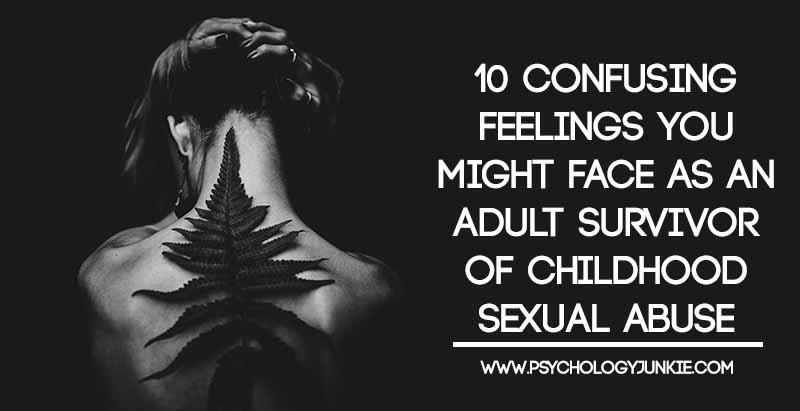
TRIGGER WARNING: If you’re recovering from PTSD related to sexual abuse this article might trigger you or it might comfort you because you’ll find solidarity. I talk about the real fears and worries I’ve experienced as an adult survivor, but they can be different for every person.
10 Confusing Feelings You Might Have as an Adult Survivor of Child Sexual Abuse
#1 – You Don’t Trust Love
If you’re anything like me you might constantly feel insecure about the relationships in your life. What is love? Does your family love you? Does your husband really love you? For my entire adult life I’ve struggled with feeling fundamentally worthless. I’ve felt ashamed of who I am because of lies I was told by my abusers. You might blame yourself for the abuse. You might have to fight constantly not to believe the lies you were told. Shame is experienced in some form by almost all survivors and just saying “hey, this isn’t your fault” doesn’t always help. Beverly Engel writes, “Emotional, physical, and sexual child abuse can so overwhelm the victim with shame that it actually comes to define the person, keeping her from her full potential.”
#2 – You Revert to an Emotional Childhood
Maybe you’ve grown up and gotten a job, maybe you haven’t. Maybe you have a family of your own now. Whatever the case, when something triggers a particularly awful memory you can find yourself reverting to the age where the abuse occurred. You can become hyper-sensitive, overly emotional, panicky, you may crumple up in a ball and become unresponsive. You may forget how to speak or interact. It’s different for everyone. But this feeling of total helplessness and childlike insecurity can be very confusing and overwhelming.
#3 – You Don’t See Sex the Way Other People Do
Romantic sex seems strange to a lot of child sex abuse survivors. For me personally, I’ve always struggled to see sex as “romantic” or “loving”. It’s a strange animalistic impulse that can be dangerous and threatening. When you’ve become sexualized through abuse, pain, and domination the notion of “romantic lovemaking” seems completely unattainable. Gentle and sweet affection can seem over-stimulating and confusing. It takes a lot of work, therapy, and healing to get past this for many of us.
#4 – You Hate Porn with a Passion
You know that a lot of the individuals on screen were sexually abused like you were. You know that a lot of them were trafficked. You know they could be underage. You know they aren’t enjoying it. Arguments about porn being “harmless” and the actors “liking it” infuriate you.
#5 – You Still Don’t Talk About it to Anyone
What happened is always there like a hiccup in your mind. But you don’t tell anyone because either you’re scared or you’re worried about being judged. You feel like if other people don’t know what happened then you can ignore it better. Unfortunately this doesn’t work and can make you feel increasingly isolated and ashamed.
#6 – Talking About it Hurts. Not Talking About It Hurts.
You talk about it. You feel exposed. You feel ashamed. It doesn’t matter how much someone tells you “it’s not your fault” you still feel like you just walked into school without your pants on and everyone’s pointing and laughing. But not talking about it hurts too. You have flashbacks and memories that haunt your every waking moment but you’ve learned to smile and fake being okay…at least most of the time.
#7 – Being a Mother (or Father) is Terrifying
You look at your child and all you can think is “please let this not happen to them”. Every day you worry about it. You check on your kids repeatedly while they sleep just to make sure nobody broke into their room and kidnapped them. Horrible images pop into your mind and all you want to do is scrub your brain out with soap and water just so that the image is gone. You wonder if you’re crazy or losing your mind. You have major anxiety about your children being alone or being abused or kidnapped. You read them books about safe touch and hope the message gets through.
#8 – You Feel Lonely But You Want to be Alone
You desperately want someone to talk to about your deepest, darkest fears and memories. You want to blurt it out to someone. But you never do. You carry this burden around and it only gets heavier with each step. You desperately want friendships but you feel like you’re being phony when you have to hide so much. You want to be alone so that you can actually try to deal with the painful memories and the fear and the shaking and the tears. But then you feel worse because you secretly wish you had someone there with you to just quietly support you and try to understand.
#9 – You’re Afraid of Anyone who Remotely Resembles Your Abusers
If you were abused by a 40-year-old man you might find yourself instantly on edge around 40-year-old men. If your abuser had a certain shade of hair, a certain smell, a certain “look” and you see someone who reminds you of that person you feel instantly terrified or sick. You might feel like you need to throw up or hide. It’s especially difficult if someone like this is a family member or someone who you know is a good, kind person.
#10 – You Might Be Disgusted By Your Body
Body dysmorphia is extremely common for survivors of sex abuse. Many survivors develop eating disorders as a way to “control” their body. Others are disgusted by anything sexual about themselves and try to hide their bodies under loose, baggy clothing or by overeating. Some survivors do the opposite and become fixated on appearing sexy because they may feel that it’s “all they’re good for”.
Solutions for Healing:
– Talk to someone. I know this is hard. BELIEVE ME, I know. But if you keep it all bottled up inside it will eat away at you. Preferably find a counselor, therapist, or hotline specialist to talk to. Being able to express your fear, worry, and anger and use real words can help you to define what happened, realize it wasn’t your fault, and find an action plan for healing.
Call 1-800-HOPE (4673) to talk to a trained staff member from a sexual assault service provider in your area. By calling this number you can get support, find local health facilities trained to care for you, you can find someone to talk to, you can find information about legal concerns, and more. It’s also completely confidential.
– Comfort your inner child. Look back at that little child you once were. What would you tell another child who had experienced the same thing? Many times we can see things clearly when we look at the situation from an outside perspective. Tell yourself it wasn’t your fault the same way you would tell another child it wasn’t theirs. Take steps to heal (like the ones mentioned in this article). Look at yourself as a child and really realize how young you were, how much you didn’t understand. Forgive yourself and comfort yourself.
– Acknowledge what you went through. Get it out. Stop letting it simmer in your mind and take over your conscious and unconscious thoughts. When you put it out there it and release it from yourself (along with taking the other steps for healing) you can finally begin to release yourself from its power.
– Let yourself grieve. It’s so much more natural to try to ignore what you went through. But getting angry and grieving the loss of your childhood can be a way of letting it go. When you bury your grief you can get stuck there, buried with it.
– Don’t let it define you. What happened to you was not your decision. That was someone else’s decision. You are so many wonderful and beautiful things and can be so many wonderful and beautiful things. You can make amazing choices and you can even help people by using your story to find solidarity and healing with others. But who you are is not what happened to you.
– Find support from people who understand. Do a google search to see if there are any support groups in your area.
– If you’re married, get couples counseling. It’s important that partners understand the long-term effects of childhood sexual abuse and find ways to deal with it together instead of the survivor dealing with it alone.
– Give yourself time. Healing doesn’t happen overnight. Know it’s okay if you still struggle and need help and counseling and space. Keep reminding yourself that it’s not your fault.
Related Articles:
10 Things Not to Say to a Sexual Abuse Survivor
The 5 Ways Our Legal Systems Fail Rape Victims
Why I Don’t Want to Be Sold Rape At the Movies
Subscribe to Our Newsletter

Want to discover more about personality type? Get the inside scoop with Susan Storm on all things typological, along with special subscriber freebies, and discounts on new eBooks and courses! Join our newsletter today!


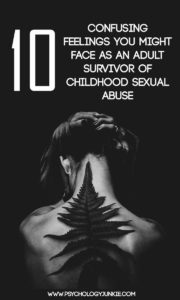
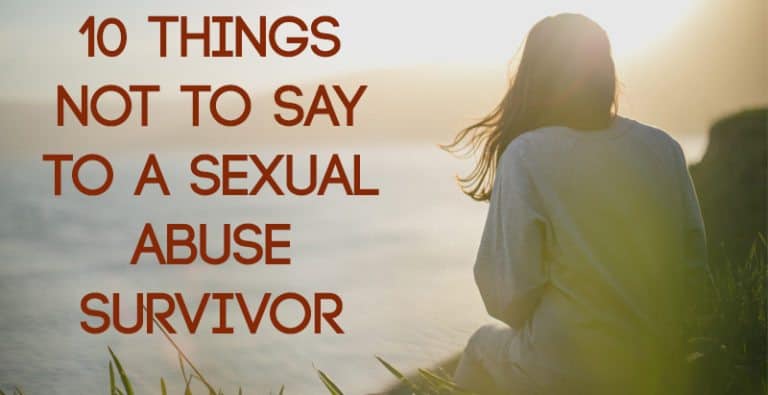
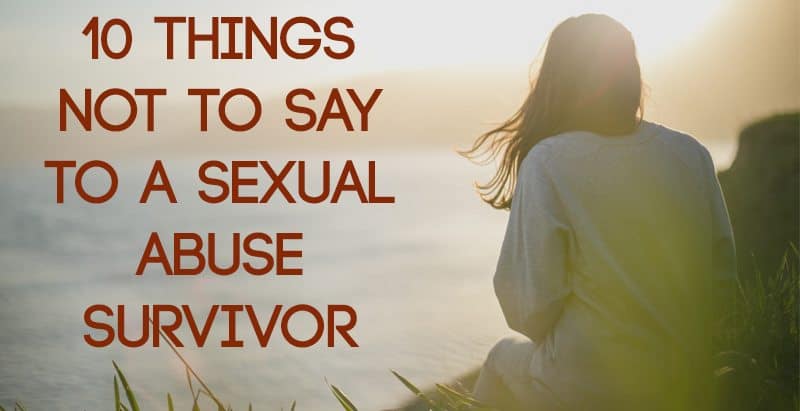
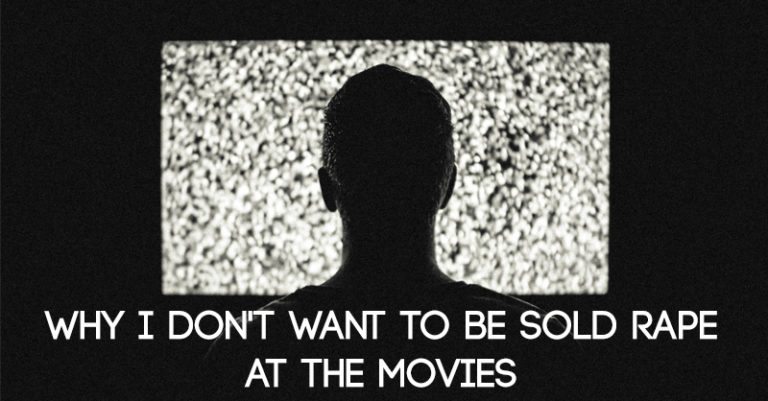
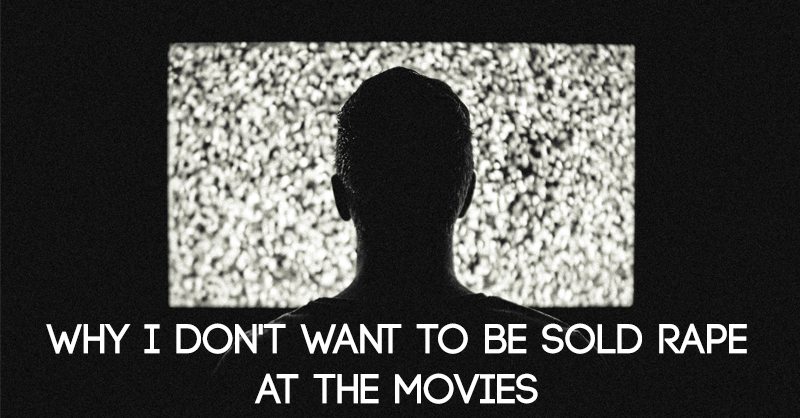
Thank you Susan!
As a therapist who specialized in sexual-related issues involving childhood trauma/abuse, I’ve found a plethora of difficulties for clients that seem to further “humiliate” them, as sexual activity (unlike drugs, alcohol etc) is something universal to all humans, and survivors of abuse have a range of hurdles to overcome, depending on so many factors that it is near impossible to group them, hence their struggles, into subcategories. I would like someone to investigate the perplexities if feeling love for their abuser. For some, the hate of the abuser swings to the other end of the pendulum, where love is felt perhaps as a survival strategy (“if he was bad and didn’t love me, then am I bad and not lovable?”) Or I find that “chasing that first orgasm” is a problem for females as vulnerability allows for the greatest of love and the greatest of heartaches. Additionally, if one was only exposed to physical touch via sexual touch, it is all that the victim knew—how can they accept that it was “gross” if they were an innocent and dare I say, loving, part of the interactions? Much dissociation starts to occur and that has its own problems as not feeling the body becomes an issue ingrained since a young age.. Moreover, many abuse survivors really like porn because it is a quick way to achieve orgasm should intimate relationships prove difficult. My best friend is a survivor and we are writing a theory currently, and find that many therapists simply do not know how much the abuse has affected the whole person, and that there is a fine line between love and hate. I look forward to discovering more modalities that can integrate the body-mind-spirit-soul so that holistic healing can be achieved. Thank you for your enlightening article and for being so brave to publish it! We look forward to reading more of your work! -ENFJenni and ENFPaityn
My dad abused me from the age of 4 until I was 11. I thought he was the only person who loved me. He gave me my first orgasm and I had deeply intense feelings for him. The abuse stopped when I was about 11 after I said “the wrong thing”. I was desperately hurt and angry that he seemed to have stopped loving me. Then he got sick and i prayed that he would die. less than a month after my 13th birthday he did. And telling anyone about loving my abuser feels like the most taboo thing in any therapy session or group setting. It makes me feel that I am in the wrong, that I am guilty and that I killed my father.
More research into this and specific therapy for people like me where there isn’t a drive to be angry and hate your abuser is needed. I don’t know what to do to heal because the part of me which needs healing, needs to grieve the death of my father as well as the loss of my first love is rarely accepted even by me.
Bang on!! Thank you🙏👣
Are nightmares also common? I wake up in the middle of the night screaming and in tears, and I can barely remember any details of the dream but I know it’s about what happened to me when I was 12. Not sure whether to pull the covers up over my head or bolt from the bedroom.